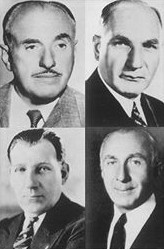
As Warner Brothers entered the fallow period of the 1950s, fraught with industry confusion and buffeted on all sides by dwindling box office returns and government intervention, Jack Warner continued to maneuver his studio through the rough waters with considerable business savvy.
While many studios (most noticeably MGM) were sinking deeper into the mire of changing times, Jack Warner’s humility – that is often discarded or unacknowledged (because it was so well hidden beneath his exterior mantel of maniacal control) continued to seek out and put under contract the top producers and directors in the industry.
In short, he permitted his studio to evolve with the times rather than fight them. Spurned by the fact that Darryl F. Zanuck’s launching of Cinemascope had invalidated his own claim to the invention, Warner countered the widescreen revolution with one of his own before acquiescing to ‘rent’ Zanuck’s superior process for several major film productions of that period, including Judy Garland’s comeback, A Star is Born (1954).
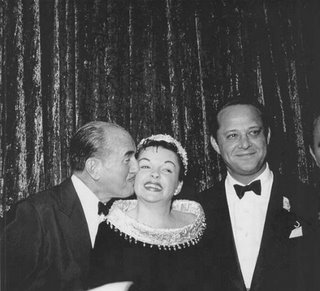
Declared a masterwork by the critics and the general public, Warner somewhat blackened his reputation in the industry by hacking into George Cukor’s film to cut down its running time. Some have even speculated that his cuts cost Garland the Best Actress Oscar. At the end of the decade, Harry Warner died of a cerebral occlusion, offsetting one of the most profitable periods in the studio’s history with a genuine note of sadness.
Even in situations where Warner felt his own opinion justified, he was still willing to gamble on another’s preference in an educated guess for greater returns to the studio. More often than not that lucky streak paid off handsomely.
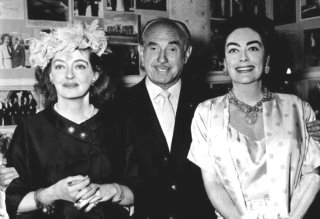
Such as on the occasion he was approached by director Robert Aldrich for the project Whatever Happened to Baby Jane? (1962). Referring to Aldrich’s choices in casting Bette Davis and Joan Crawford as his two female leads, Warner bluntly replied, “I wouldn’t give you a dime for those two old washed up broads:” this despite the fact that Davis had been the studio’s greatest attraction for nearly two decades and Crawford had won her one and only Oscar for Mildred Pierce.
Refusing to allow Aldrich the use of his studio backlot (as he desired to sufficiently divorce himself from what he considered a possible debacle), Jack Warner agreed to a distribution deal that ultimately became one of the biggest and most sound financial investments for his studio when Baby Jane became a runaway smash hit.
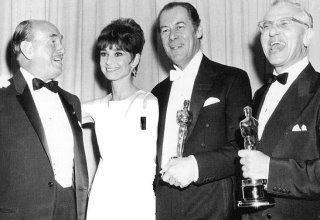
Throughout the 1960s, Jack Warner continued to diversify his studio’s interests. Although he had outlasted many of his contemporaries in the business through wit and often cutthroat business tactics, he showed little signs of slowing down.
He outbid every other studio for a record $1.6 million investment and personally supervised and produced My Fair Lady (1960) – one of the last grand musicals to emerge from the studio system, and, he continued to have his fingers in all the proverbial artistic pies.
When it was revealed to the public that the studio
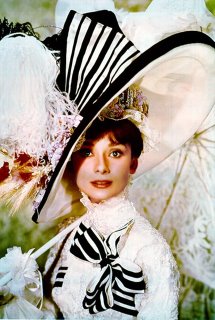 had dubbed Audrey Hepburn’s vocals for My Fair Lady with Marnie Nixon’s voice, Warner’s adept acknowledgement of that common practice in Hollywood met the backlash with a glib reply: “I don't know what all the fuss is about. We've been doing it for years. We even dubbed Rin-Tin Tin.”
had dubbed Audrey Hepburn’s vocals for My Fair Lady with Marnie Nixon’s voice, Warner’s adept acknowledgement of that common practice in Hollywood met the backlash with a glib reply: “I don't know what all the fuss is about. We've been doing it for years. We even dubbed Rin-Tin Tin.” By 1967, the ways of the old Hollywood had passed. The once close-knit artistic community had been replaced by a freelance sea of independent producers vying for their own supremacy and desperately trying to remain above the water line of red ink.
In November of that year, Albert Warner quietly passed away in Miami Beach and Jack Warner – the youngest titan in his family dynasty, was left as the sole heir to a business he had helped transform into one of the most beloved, profitable and respected touchstones within the industry.
Functioning in his later years as an independent producer, (most notably in bringing the hit musical, 1776 to the screen) Jack Warner never seemed to tire of the dizzying excitement associated with making movies. Ever looking toward to yet
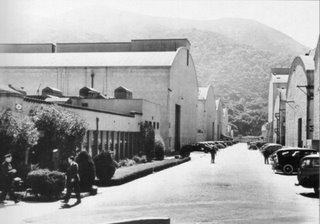 another project on the horizon, Jack L. Warner expired from a pulmonary edema and heart inflammation on Sept. 9, 1978.
another project on the horizon, Jack L. Warner expired from a pulmonary edema and heart inflammation on Sept. 9, 1978.In the intervening decades his legacy as a mogul has been unjustly distilled to that of an unfunny prankster; a man who barely tolerated his directors, despised all of his writers, abhorred most of his actors and all but boycotted the onslaught of Hollywood agents.
Few who have made short shrift of his tenure in such an
 unflattering light have bothered to invest equal time to list, or even more importantly, reexamine the depth of his formidable accomplishments in the art of making movies.
unflattering light have bothered to invest equal time to list, or even more importantly, reexamine the depth of his formidable accomplishments in the art of making movies.At times, misguided, Jack Warner’s zeal for creating great entertainment has often been overshadowed by that drive and ambition he possessed to attain a place amongst the greats in his profession. But achieve greatness he did, and not merely for himself – as has also often been said and written of the man and his mission. For, in the final analysis, Jack L. Warner has proven to be his own worst enemy, because he was a man of conviction in this contemporary age that misconstrues purpose as mere audacity and unmitigated cheek.
@Nick Zegarac 2006 (all rights reserved).
No comments:
Post a Comment